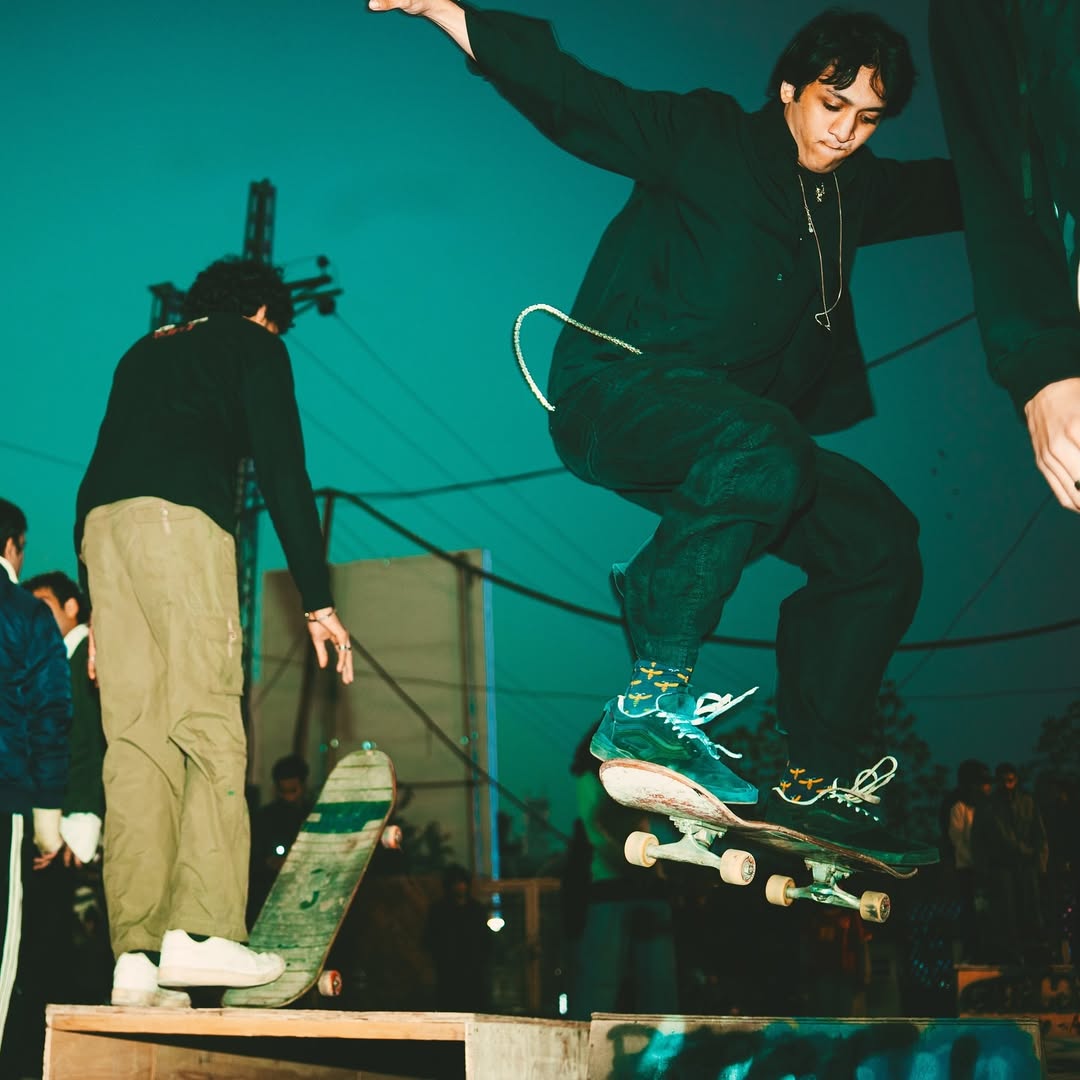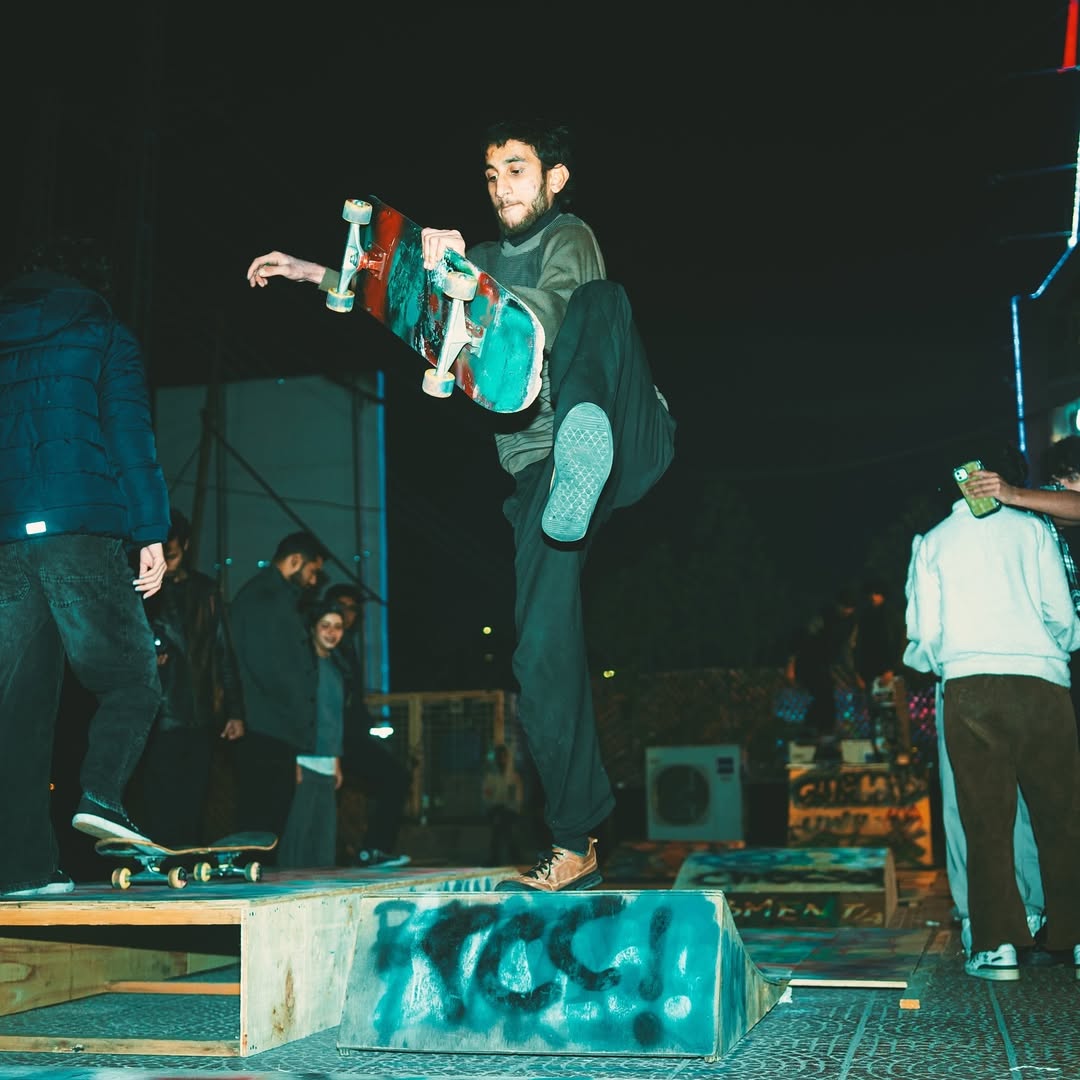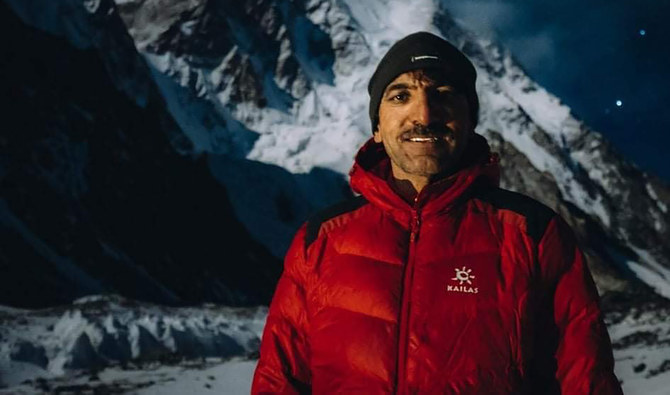ISLAMABAD: Sajid Sadpara, the son of Pakistani climber Muhammad Ali Sadpara, who went missing with two other climbers while attempting a winter ascent of the K2, addressed a press conference on Thursday and announced his father’s death, saying he would keep his father’s climbing mission alive.
Pakistan’s Sadpara, Iceland’s John Snorri and Chile’s JP Mohr were last sighted on February 5, at around 10 am, at what is considered the most difficult part of the climb: the Bottleneck, a steep and narrow gully just 300 meters shy of the 8,611 meter (28,251 ft) high K2.
Addressing a joint news briefing with Gilgit-Baltistan’s tourism minister Raja Nasir Ali Khan, Sajid, who last saw his father at about 8,200 meters, said he was sure that Sadpara had completed the ascent of the K2.
“I’m quite certain along with other international climbers with significant experience that they summited the mountain before meeting an accident on their way back,” he said.
“God willing, we will all support each other in this hour of grief,” he added. “I also want to assure our nation and all those climbers who respected Ali Sadpara that I will follow in my father’s footsteps and continue his mission.”
Sajid said that his family was thankful for all the love expressed by the people of Pakistan.
Meanwhile, the region’s tourism minister requested the government to present a civil award to Sadpara and his son.
He also said Chief Minister Gilgit-Baltistan Khalid Khurshid would personally announce a financial package to support the Sadpara family.
“We will arrange scholarships for [Sadpara’s] children to help them with their education,” Khan said. “We will also request [the government] to name the Skardu airport after Muhammad Ali Sadpara and do the same with the mountaineering school in Shigar district.”
Nestled along the China-Pakistan border, K2 is the world’s second highest peak and its most deadly mountain, with immense skill required to charter its steep slopes, high winds, slick ice and ever-changing weather conditions. Of the 367 people that had completed its ascent by 2018, 86 had died. The Pakistani military is regularly called in to rescue climbers using helicopters, but the weather often makes that difficult.
Earlier in January, a team of 10 Nepali climbers made history by becoming the first to ever scale K2 in winter. Sadpara and his expedition members were making their second attempt at climbing K2 this winter in a season that had already seen three other climbers die in the area.
In a statement, the Alpine Club of Pakistan called Sadpara “our national hero.”
“Our deepest sympathies go out to Mountaineers families,” Karrar Haidri, the club’s secretary, said. “May God give them comfort and peace and may the soul of Mountaineers rest in peace.”
In a statement, Snorri’s family thanked authorities in Pakistan, Chile and Iceland “for their devotion and efforts for finding our loved ones.”
“There is no doubt in our minds that the extent of the search and the technologies used in the search were unprecedented and hopefully will improve the safety of future mountaineers around the world,” the statement said. “The Pakistani Army has been extremely supportive in these difficult times sharing resources and manpower. To the brave people of the Pakistani armed forces we say thank you for caring for Ali, John and Juan Pablo.”
“Our Icelandic hearts are beating with Pakistani and Chilean hearts. Thank you to all who have devoted your time to the search and taken the time to care by sending supportive words and thoughts to us in these difficult times. Ali, John and Juan Pablo will live forever in our hearts.”
Mohr’s family also thanked the Pakistan government, government of Gilgit Baltistan and the Pakistan army and “with a special mention to Sadpara family, for all the support and friendship and their friends and people from Skardu, who’s love for Ali, JP and John is now forever in our hearts.”
“We will continue their legacy, together,” the Mohr family said.
'Our hero': Search off for Pakistan’s Ali Sadpara, two other missing K2 climbers
https://arab.news/zpp2h
'Our hero': Search off for Pakistan’s Ali Sadpara, two other missing K2 climbers

- Sadpara, Iceland's John Snorri and Chile's JP Mohr were last sighted on Feb. 5 trying to complete a winter ascent of the K2
- Earlier in January, a team of 10 Nepali climbers made history by becoming the first to ever scale K2 in winter
Pakistan won’t turn blind eye to allies’ wrongdoing, says deputy PM on US strikes in Iran

- Ishaq Dar says Pakistan ‘didn’t hesitate or delay’ in condemning US strikes, despite improving ties with Washington
- The United States launched airstrikes in Iran this month, claiming to have set back Tehran’s nuclear program by years
ISLAMABAD: Pakistan’s Deputy Prime Minister Ishaq Dar said on Friday his country did not turn a blind eye to US airstrikes on Iranian nuclear facilities earlier this month, adding that close relations with a country do not justify silence in the face of wrongdoing.
The statement came during a news briefing in the federal capital, where Dar spoke to the media about Pakistan’s recent diplomatic engagements, including his participation in the Organization of Islamic Cooperation (OIC) meeting in Istanbul and the Pakistan-United Arab Emirates Joint Ministerial Commission.
Despite a recent revival in bilateral ties with Washington, Pakistan formally condemned the US strikes in a statement, calling them a violation of international law and affirming Iran’s right to self-defense under the UN Charter.
“Just because relations are good with a country doesn’t mean you should consider something wrong to be right,” he told the media.
“As you witnessed, we didn’t hesitate or delay,” he continued. “I spoke with the foreign secretary, gave a task to the spokesperson and we exchanged draft statements. It’s now a part of the historic record: we criticized the attack, and we did it on record.”
Dar’s remarks came in the wake of a 12-day conflict between Iran and Israel that erupted after Israeli strikes targeted Iranian nuclear and military sites, prompting retaliation from Tehran.
The war began while the administration in Tehran was holding nuclear negotiations with the US that later joined the fray, launching its own strikes on three Iranian nuclear facilities.
While Washington said the attacks had set back Iran’s nuclear program by years, there was international concern over a wider regional war.
Dar said he had been personally involved in formulating the country’s response as Islamabad prepared its official statement.
Pakistan, currently a member of the United Nations Security Council (UNSC), also raised the issue at the world body in New York.
Pakistan approves 10% gas price hike for industry, power plants under IMF conditions

- ECC spares households in gas price hike, with only fixed charges adjusted to recover costs
- It also approves grant for defense ministry to cover shortfall in salaries, allowances and dues
KARACHI: Pakistan on Friday approved a 10 percent increase in natural gas prices for industrial users and power plants starting next month, in line with reforms mandated by the International Monetary Fund (IMF) to ensure cost recovery and tariff rationalization, an official statement said.
The decision was taken by the Economic Coordination Committee (ECC) of the Cabinet, chaired by Finance Minister Muhammad Aurangzeb.
While prices for bulk consumers and gas-fired power plants will rise, household consumers will be shielded from the increase.
“To protect household consumers, gas prices will remain unchanged, with only fixed charges revised,” the Finance Division said in a statement released after the meeting. “However, prices for bulk consumers, industrial units and power plants will be increased by an average of 10 percent.”
The statement said the revised pricing structure, submitted by the Petroleum Division, complies with regulatory obligations under the OGRA Ordinance and meets structural benchmarks under Pakistan’s ongoing loan program with the IMF.
It also supports a shift from cross-subsidies to direct, targeted assistance for low-income consumers.
DEFENSE GRANT
The ECC also approved a Rs15.8 billion ($55.3 million) supplementary grant for the Ministry of Defense to cover a shortfall in salaries, allowances and pending dues.
The funding includes disbursements under the prime minister’s compensation package for martyrs of the recent Pakistan-India war fought last month.
In a separate decision, the committee gave in-principle approval to launch a risk coverage scheme for small farmers and underserved regions by August 14.
The program is expected to bring 750,000 new borrowers into the formal credit system and unlock a Rs300 billion ($1.05 billion) agricultural loan portfolio over three years (FY2026-28).
The statement said the total budgetary support for the scheme, covering risk coverage and bank operating costs, is estimated at Rs37.5 billion ($131.25 million), to be disbursed between FY2027 and FY2031.
The government has directed relevant ministries to incorporate additional safeguards before the official rollout.
Pakistan naval chief calls for tech-driven forces to tackle future conflicts

- Admiral Naveed Ashraf says recent conflicts in South Asia and the Middle East show how modern warfare has evolved
- He warns that new geopolitical shifts and power rivalries are affecting security environment in the Indian Ocean Region
ISLAMABAD: Pakistan’s Naval Chief Admiral Naveed Ashraf on Friday said future wars will be won not just through firepower but by forces that are intellectually and technologically superior, urging a strategic shift in how militaries prepare for evolving threats.
Speaking at the Pakistan Navy War College in Lahore, he pointed to recent Iran-Israel and Pakistan-India conflicts as examples of how warfare has changed.
Traditional dogfights and infantry movements were notably absent from these military standoffs, replaced by precision strikes, electronic and cyber warfare.
The shifting nature of these engagements, he said, underscores the need to rethink legacy doctrines and build forces fit for the future.
“The conventional, one-dimensional study of warfare is now outdated,” Ashraf told graduating officers of the 54th Pakistan Navy Staff Course. “Winning future wars demands not only a re-evaluation of legacy warfighting strategies, but also the development and maintenance of a future-ready workforce that is intellectually astute and technologically proficient.”
Discussing the maritime challenges facing Pakistan, the naval chief said the Indian Ocean Region (IOR) was “fluid and contested.”
He also highlighted that new geopolitical realignments and ongoing power rivalries in the region, saying they were affecting the security environment in the IOR.
Ashraf congratulated the graduates while encouraging them to be more analytical and innovative in their upcoming assignments.
British Council, Sindh government to train 30,000 teachers, impact two million students

- The initiative aims to improve language teaching through inclusive and multilingual methods
- It builds on the success of a similar program in Punjab, which benefited over 140,000 teachers
ISLAMABAD: The British Council and the Government of Sindh have signed a Letter of Intent (LoI) to improve English language teaching in public schools, aiming to train 30,000 teachers and indirectly benefit over two million students, according to a statement issued on Friday.
English is a compulsory subject in Pakistan’s schools and colleges and remains the dominant language in government, academia and the corporate sector. Despite years of formal exposure, however, many students struggle to use the language effectively, raising concerns about the quality and methods of instruction.
The new initiative aims to address these challenges by equipping teachers with inclusive and multilingual approaches that support more effective language acquisition.
“This agreement renews our partnership with and commitment to the people and Government of Sindh,” said James Hampson, Country Director, British Council Pakistan. “Our ambition of supporting 30,000 teachers and 2 million children is a great next step.”
Under the agreement, the British Council will deliver its “English as a Subject for Teachers and Educators” (EaSTE) program to newly inducted primary and early childhood teachers.
The collaboration also includes training 1,000 in-service teachers as mentors and deploying a scalable digital Learning Management System (LMS) to facilitate continuous professional support.
“Our focus is not just on access but on quality,” said Sindh Education Minister Sardar Ali Shah at the occasion. “Through this initiative, we are equipping our teachers with the tools they need to teach English more effectively, in ways that reflect the linguistic and cultural realities of our classrooms.”
The program builds on the British Council’s long-standing work in education in Pakistan and replicates a successful model from Punjab, where EaSTE reached more than 140,000 teachers.
From pavement to passion: Islamabad’s young skateboarders push for recognition

- As nation where nearly 64% population is under 30, Pakistan is fertile ground for growth of youth sport like skateboarding
- Skateboarding remains unrecognized in Pakistan, there are no dedicated skate parks and shops and few coaches available
ISLAMABAD: On a hot summer afternoon in Islamabad’s F-9 Park, laughter echoed across the cracked concrete as teenagers cruised over curbs and kick-flipped their boards with casual defiance.
For this small but growing community of skateboarders in the Pakistani capital, the pavement is a playground — and a protest.
Globally, skateboarding has long been associated with youth culture. It is a sport that thrives in urban settings and offers young people a sense of identity, freedom, and creative expression. Since its rise in the United States in the 1960s, it has evolved into a global movement, now part of the Olympic Games and supported by thriving communities from Brazil to Japan.
In this context, Pakistan is fertile ground for the growth of skateboarding — a nation of over 240 million people where nearly 64% of the population is under the age of 30. But the country does not officially recognize skateboarding as a sport. Its official game is field hockey but cricket dominates pitches, TV screens and public discourse. Other sports like football, badminton and volleyball enjoy some government support but skateboarding remains entirely on the fringes.
“There’s not even one dedicated skate shop in Pakistan,” said Ali Arsalan, a 21-year-old engineering student who founded Skate Pakistan, a grassroots movement using Instagram to grow and connect the local skate scene. “It’s still seen by many as a toy.”

Arsalan’s Instagram page, started in 2021 “just to see if anyone else was skating,” soon connected him to others across Islamabad and beyond. Today, Skate Pakistan meetups attract 12–15 regulars, with larger competitions drawing dozens. Most participants are teenagers with limited access to professional training or gear, and the initiative is driven entirely by volunteers and enthusiasts, growing into a fledgling community of teens and young adults passionate about the sport and eager to see it taken seriously.
Arsalan’s own introduction to skateboarding came through Hollywood films as a child. At the time, he assumed the aerial tricks were camera tricks.
“Honestly, I used to think it was fake,” he said, laughing. “Like, how can a board that’s not even attached to your feet fly up like that?”
Curious, he bought a cheap board from a local sports shop in 2019. With no coaches or skateparks in Islamabad, Arsalan turned to YouTube tutorials and online courses to learn the basics.
“My first day on the board, my father was holding one arm and my brother held the other. I was just praying I wouldn’t fall,” he said.

Fall he did and repeatedly. But with each tumble, he said, the fear wore off.
“The more I fell, the more this fear lessened.”
While Pakistan has a few modest skateparks — including one in Skardu, Gilgit-Baltistan, and another set up with German NGO support in Karachi in 2020 — most skateboarders still ride on sidewalks, underpasses, or abandoned lots.
Security guards at parks often ask them to leave. Potholes, rough terrain, and broken pavement pose daily hazards.
But the lack of infrastructure and support hasn’t stopped the community from growing.
“I mean, it’s fun, it’s something physical, you’re out with your friends, so why not?” said Hasaan Khan, 16, a regular at the sessions held in Islamabad’s F-9 park.
“Skateboarding builds up your endurance, since you keep falling over and over again,” added Rija Mughal, also 16. “It’s pretty good for your physical health too.”
BUILDING A MOVEMENT
For many, skateboarding took off during COVID-19, when lockdowns closed schools and sports grounds.
“I found an old skateboard at home during COVID, had nothing else to do, so I started riding around,” said Ahmed Ali Rana, who was 13 at the time. “It just clicked.”

Rana said he was nervous at his first Skate Pakistan competition but was surprised by how welcoming everyone was.
“That’s the best part. It’s not just about the sport, it’s about the friends and the community.”
Zayan Nadir, another teen skater, said skating gave him a mental escape:
“It helps people get away from their problems. But to build a bigger community in Pakistan, you need more skate shops, more skate parks, and more freedom for skaters.”
Currently, there’s no national or provincial skateboarding federation, and the Pakistan Sports Board does not include the sport in its list of recognized disciplines. In contrast, neighboring India has had multiple international skateboarding events and boasts over two dozen skateparks, including some that cater to underprivileged youth.
The inclusion of skateboarding in the Tokyo 2020 Olympic Games also helped raise its profile globally, particularly among younger audiences. Yet, in Pakistan, there is little official recognition, funding, or visibility.

Arsalan said public perception also remained a big hurdle.
“There’s still this idea that a skateboard is a toy, not a sport,” he said. “That’s what we are trying to change through social media.”
At a recent meetup, teenagers practiced ollies and kick turns on a concrete ramp while others filmed slow-motion footage for Instagram reels. There were no referees, no medals — just scratched boards, scraped knees, and smiles.
Arsalan said the goal now was to push for formal recognition and better infrastructure so more young people across Pakistan could skate without obstacles — literal or social.
“We just want people to see that this is serious,” he said. “It deserves space, support and respect.”










